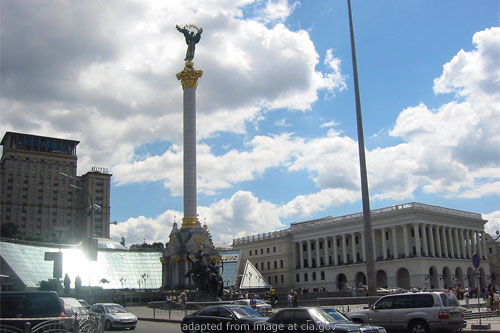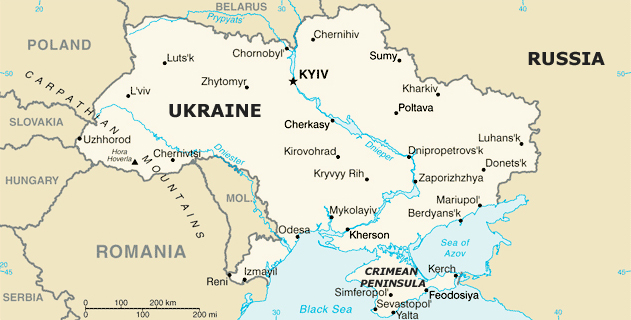Russia’s Confederal-Disintegration, Not Federal, Proposal for Ukraine

Subject: Russia’s confederal-disintegration, not federal, proposal for Ukraine
Date: Sun, 6 Apr 2014
From: Ira Straus (IRASTRAUS@aol.com)
Re Washington Post aticle “Kiev sees Russian federalization plans as attempt to destroy Ukraine.”
I think it’s not just interesting but important. It says Ukrainians, by large polling majorities even in the East and South, reject Russia’s “federalization” proposal, and explains why it is viewed, rather logically, as a proposal for breaking apart their country. Which makes it a case of Russia truly trying to tear apart a country. And a huge addendum to Russia’s habit of accusing the U.S. and the West, falsely, of trying to tear apart Russia.
As a federalism and international integration scholar, I think it’s important for people to understand that Russia’s proposal is not really for “federalization” — that is something like false advertising — but for confederalization. Lavrov is calling on Ukraine to become a confederation, because he is asking it to give each region of Ukraine, in his words, authority over its own “economics, finance, culture, language, education, foreign economy and cultural ties with neighboring countries or regions.”
Confederation is, as Prof. Murray Forsyth explained in his book “Unions of States: The theory and practice of Confederation” (1981), the space within political development that covers state-formation and state disintegration. State construction: when we are discussing groupings that are beginning to unite into what may someday become a joint federal state, as the U.S. did in forming the Articles of Confederation and then moving on to the Constitution which enabled us an enduring Federal Union. State deconstruction: when we are discussing a state that used to have a unified existence, no matter whether unitary or as a federation, and is losing it.
It is clear in which of these two directions Russia is pushing Ukraine.
The CIS, incidentally, is a confederation, created to soften the deconstruction of the Union state, making sure it would be peaceful and not destroy all links. Russia’s numerous attempt to push it back the opposite direction, into an instrument for some degree of state reconstruction, have repeatedly failed. With Russia now resorting to other means, outside of CIS.
Russia’s confederal proposal on Ukraine closely replicates Brzezinski’s proposal (in The Grand Chessboard, 1997) for devolving Russia into a confederation. A proposal that Russia received with fury as an attack on their country’s existence, and used eventually as an argument for reverting toward enmity to the West.
In Brzezinski’s scenario, each part of a confederal Russia would have come under a different predominant foreign influence — one part dominated by Western influence, one Middle Eastern, one Chinese. Americans almost unanimously rejected the thought – those few who ever heard of it — since it would greatly strengthen the Islamic and Chinese powers, whence emanate deep threats and potential dangers to the West; while weakening a Russia that at the time was a semi-partner of the West.
Russians rightly described Brzezinski’s confederation proposal as one for tearing apart their country. Russians however also wrongly treated it (in the words of one JRL contributor) as an American “call to war”. When actually it was just the personal view of an aging writer who had been out of the government for the entire preceding 15 years.
Russian writers and officials frequently described Brzezinski’s book as stating the policy and intention of America. Probably this was how it was described most of the time over there (although this is just my impression; it would be hard to collect adequate evidence on it). Thereby defining America as an existential enemy, a power that was trying to tear apart their country’s very existence.
This laid a foundation for Putin’s recurrent unfounded accusations, in 1999-2000, and again from 2004 onward, that America and the West were trying to tear Russia apart. The most famous, but far from unique, incident was his attribution of the Beslan terrorist attack to foreign powers that were trying to break apart Russia and take a chunk out of it. All of the West’s powers and influences around the world were depicted, in Russian analysis, as potential and probable instruments of pressures on Russia. All the Western pressures on Russia in turn, real and imagined, were depicted as part of the grand scheme of tearing Russia apart. (From which a Russian might be reasonably expected to conclude that Russia should oppose Western power everywhere; and to be reluctant even to make exceptions for obvious cases such as Afghanistan. And in fact Putin had to fight hard against the nationalist reasoning system he had set up, and put in control of most of the national media, when he decided to support the American effort in Afghanistan.)
This in turn was the basis for re-revising Russia’s military doctrine, implicitly in 1999-2000 and explicitly in 2010, to count the West once again as a threat to Russia. And this in turn was the basis for Russia’s actual drift, intermittent but cumulative, back toward enmity to the West. Many Russians no doubt figured they were just going to use the West-as-enemy image instrumentally, in order to make it easier to define a shared Russian identity of their own and shore up Russia’s cohesion as a state; but in the process Russia turned itself into something of a real enemy to the West in one effort of the West after another around the world. It was a heavy price for imputing to the West, dishonestly, an enmity to Russia.
In reality, Brzezinski’s idea was supported only by the long-retired Brzezinski himself, and perhaps one other somewhat well-known former official, Paul Goble. What better explains Brzezinski’s view on this subject, his American status or his Polish background? A more intelligent Russia would have asked itself whether Americans would want to divide Russia three ways, two of the parts going to Islamic and Chinese spheres of influence, whence emanate far deeper threats and potential dangers to the West. And would have realized that the answer is simple: that practically no Americans do want that. The Americans were telling the truth when they said they didn’t want to break up Russia. The Russians were demonizing America for their own reasons, whether political or psychological.
In the present case, it is not a retired official, but the Government of Russia and its Foreign Minister who are talking about confederation for Ukraine. In which a third to a half of Ukraine is to fall under directly dominant Russian influence, permanently useful for destabilizing the whole and keeping the rest subject to Russian pressure and manipulation.
This is not just as an official Russian government proposal. It is presented with the accoutrements of an ultimatum: it is backed by explicit threats, some of them already in process of being implemented, of further destabilization of the country if it does not comply, and of this leading to military seizure of a third or more of Ukraine’s territories.
This makes it a literal assault on the existence of Ukraine. It makes Ukrainians justified in treating it as something near to a call to war. It is parallel in its logic, but opposite in its official significance, from the personal literary exercise from Brzezinski; the very one that Russia treated as a call to war, and used as an argument for doing the sorts of things it is doing now.
The West might do well to urge upon Ukraine to become a genuine federation, as Anatol Lieven has suggested. To be sure, one would have to take care that it took a form that was not overly decentralized, and would not facilitate further disintegration or a dominant political influence by Moscow over Eastern Ukraine.
Done well, it could deflect the Russia’s falsely advertised federal proposal with a truly advertised one. Russians might hope, or fear, that it would serve as a model for Russia itself to stabilize, as a genuine democracy and federation. Instead of staying stuck in the trap of what Prof. Carl Friedrich accurately called the “facade federalism” and “facade confederalism” of the Soviet Union and Yugoslavia. The term describes also today’s Russia with its power vertical.
The Communist facade federations, despite great surface strength and stability — far greater than today’s Russia — fell apart, and their countries fell apart with them. The attempt of Gorbachev to reform his into a genuine federation with genuine democratic legitimation came too late, and amidst too many contradictory pressures from the opponents of reform, who, according to Gorbachev, prevented him in late 1990-early 1991 from agreeing to early new Union elections that would have given the Union government a new infusion of democratic legitimacy. Mesic’s somewhat similar attempt, in the period when he was supposed to have been president of Yugoslavia, likewise came to naught.
I fervently hope Russians will not again be too late, or again compound the difficulties in the course of the attempt. And, as a part of that, I hope they will not further disintegrate Ukraine, imagining perhaps that they are reinforcing the morale of their state by expanding its reach, but also providing themselves a model for disintegration, and quite possibly getting a new insurgency on their hands.
But I do not wish to make any predictions in this. The science of turning empires into federations has been a dismal science. Even the British empire of loyal colonists — America, Canada, ANZ — failed in all its attempts, from Benjamin Franklin to Joseph Chamberlain. But it is not a hopeless science; Franklin and his friends did succeed in creating an enduring rump union after the break-up of 1776, and there is much to be learned positively from the failures, such as the importance of timely, honest, free central elections. Gorbachev is hardly to be blamed for not having been able to pull it off, in the much more raucous, far less loyal Soviet empire. It is a matter for concern, that Russians nowadays mostly prefer to blame the failure on him — the “stab in the back” myth, closely parallel to the one the Nazis used — and/or on the CIA. Today’s Russia, as a topographically compact state with far greater ethnic cohesion than the USSR, still has at least a reasonable chance; that is the most of the guess I can hazard.

